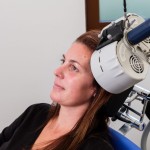What is TMS?
Transcranial Magnetic Stimulation (TMS) is a series of repetitive, brief and highly focused magnetic pulses, used to stimulate brain cells. TMS is an effective, non-invasive, outpatient treatment with few known adverse effects.
TMS is currently used in the treatment of Major Depressive Disorder and is usually prescribed when anti-depressants have failed.
How does TMS work?
When a nerve cell ‘fires’, an electrical impulse travels along its length. It communicates with other nerve cells by releasing neuro-transmitters, which create an electrical impulse in other cells. In depressed patients, the electrical activity in certain areas of the brain have been shown to be reduced. TMS uses a focused electromagnetic coil, to rapidly pulse a magnetic field to the targeted area of the brain.
The magnetic pulses induce an electrical current in the brain, stimulating the nerve cells, increasing the brain activity to normal levels.
Why is TMS different to other treatments?
Medication like anti-depressants are systemic, which means that the medication is absorbed into the blood stream which can cause numerous side effects. TMS is typically prescribed when anti-depressants have failed or the side effects are intolerable; this may be called treatment resistant depression, or TRD.¹
Other treatments for TRD include Electro-Convulsive Therapy (ECT), which works by applying a brief electrical pulse to the brain that medically induces a seizure. ECT is performed in a hospital and you will be anaesthetised and restrained during the procedure. ECT can be associated with numerous side effects. TMS is a gentle, non-systemic, outpatient procedure with has few known associated side effects. Patients can return to their daily activities after treatment.
1. https://www.ncbi.nlm.nih.gov/pubmed/12706951
Are there any side effects?
TMS is a safe and well-tolerated treatment with few known adverse effects. Clinical trials show that the most common side effects are mild to moderate scalp discomfort and mild headaches, both of which are short-term.²
2. https://www.ncbi.nlm.nih.gov/pubmed/22689344
Is TMS an option for me?
TMS therapy is appropriate for adults with Major Depressive Disorder (MDD), who have failed to achieve satisfactory improvement from prior antidepressant medication in the current episode.
This means that if you have been diagnosed with MDD and medication is not working, or the side effects are intolerable, you should ask your doctor about TMS.
-Thanks to Magstim


